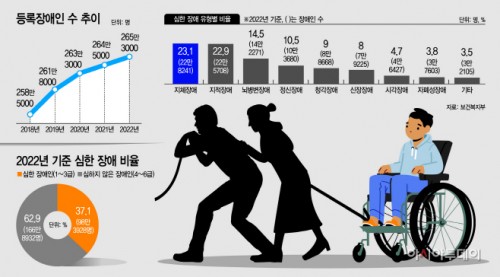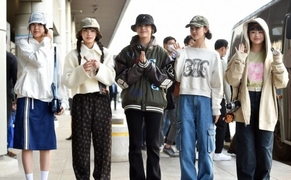 |
AsiaToday reporters Lee Seung-wook, Kim Hyung-joon, Kim Min-joo
There are “shadow disabled people,” who live in the shadow of the disabled and endure inconvenience and pain for the rest of their lives. Families with severely disabled people, who cannot live their daily lives on their own, should live as shadows, whether voluntarily or not.
However, social attention is relatively little just like the burden they have to bear. In the absence of social support and interest, it often leads to an extreme crisis. Experts say it is time to pay attention to the families with disabled members as much as efforts to restore the daily lives of the disabled.
According to the Ministry of Health and Welfare on Wednesday, there are 2,652,860 people registered as disabled in Korea as of the end of 2022. Among them, people with severe disabilities account for 37.1 percent or 983,928. By type, physical disabled account for 23.1 percent, followed by intellectually disabled with 22.9 percent. 37,603 or 3.8 percent suffer from autistic disorders.
Nearly four out of 10 disabled people are those who need care of someone else. And there are many families who must live as “shadow disabled”.
The daily lives of the shadow disabled are no different from the disabled because they have to share everything in their life with their family members with disabilities. Kim Myung-hee, 58, who supports her 29-year-old intellectually disabled son Kang Yeon-dae. She spent her entire life taking care of his son. “My son was diagnosed with acquired disability due to myeloid leukemia when he was four years old,” she said. “Lenox syndrome causes convulsions four to five times a day. He is not able to go to the bathroom by himself and needs a wheelchair when going outside. I have to take care of him 24 hours a day.”
Fortunately, Kang receives care services from daycare center for the severely disabled. Kim takes his son to the welfare center by 10 a.m. every day, and picks him up at 4 p.m. In other words, she is free for six hours. After picking up his son from the care service, she must live her life as a caregiver.
It has even institutional restrictions as well. Under the current law, the daycare service for the severely disabled at the daycare service can be extended by two years after using the service for three years. But it can be only used for up to five years. “I don’t have any measures that can take care of my son after the care service is over,” Kim said.
The reason why Kim needs to extend care services is related to her family’s livelihood. Kim has been working part-time at a restaurant for six hours, while leaving his son to the daycare service center. Families with severely disabled people, who often lack economic independence, have to earn a livelihood. The vicious cycle in which disability leads to economic difficulty and poverty makes it difficult to support the disabled is repeated. “Even though I have to work due to the difficult economic situation, it is difficult to work regularly because I cannot leave my child at the center when he is sick,” Kim said.
“In the case of severely disabled people, their families are difficult to engage in economic activities and they sacrifice most part of their daily life. They need social interest and support,” said Hong Seo-joon, a researcher of the Korea Blind Union.
#disabled #families
Copyright by Asiatoday
Most Read
-
1
-
2
-
3
-
4
-
5
-
6
-
7





















